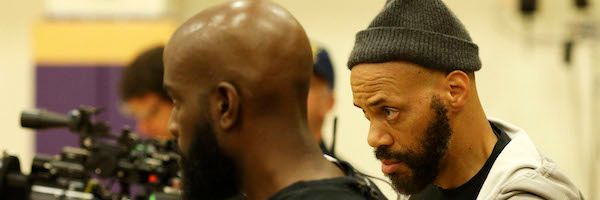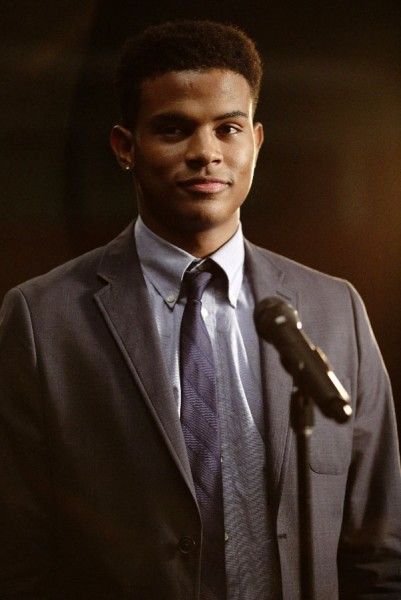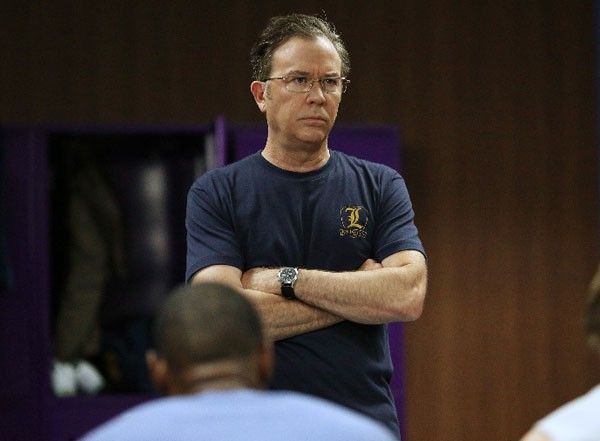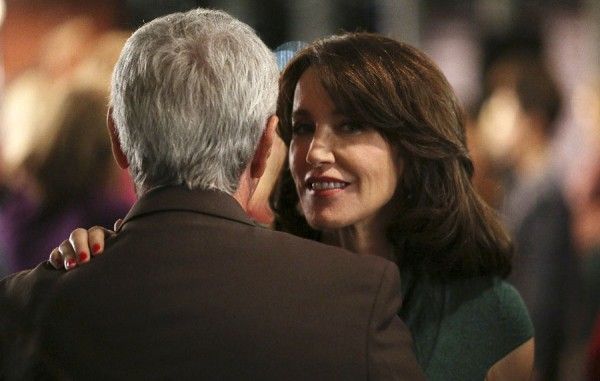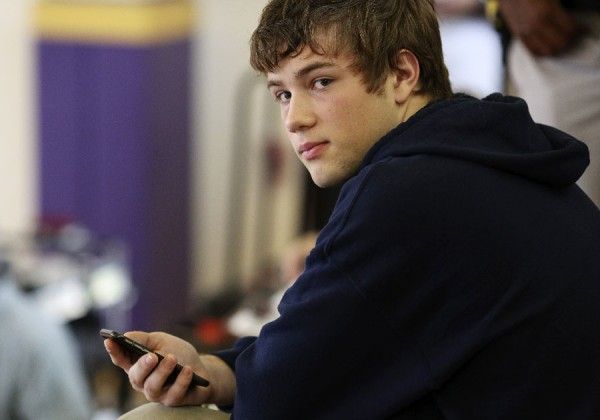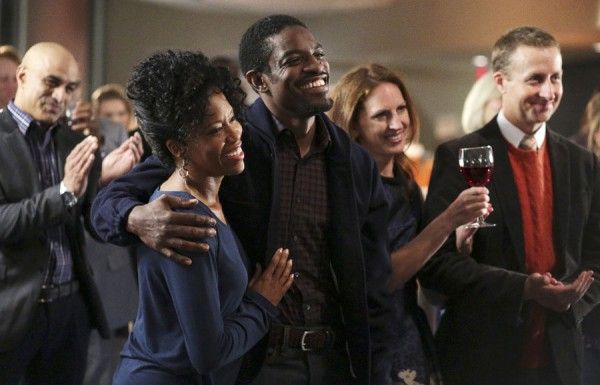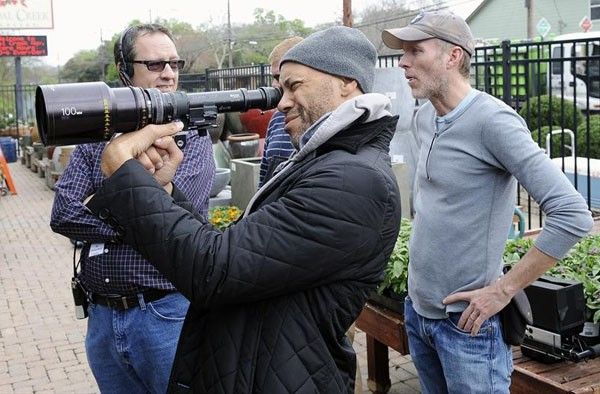The second season of the ABC drama series American Crime is set in the U.S. Midwest at two high schools, one public and one private. Issues of sexual orientation and socio-economic disparity reach a boiling point when lurid photos of a high school boy, Taylor Blaine (Connor Jessup), are posted on social media following a school party and Taylor accuses two players on an elite private high school’s championship basketball team, Kevin LaCroix (Trevor Jackson) and Eric Tanner (Joey Pollari), of drugging, assaulting and then posting the pictures of him online. While the private school struggles to maintain its reputation in the face of these accusations, the lives of the students and teachers at both schools become inextricably linked.
During this exclusive phone interview with Collider, executive producer John Ridley (the Academy Award-winning screenwriter for 12 Years A Slave) talked about how Season 2 of American Crime took shape, being proud of what they accomplished with Season 1, deciding on a topic that can include many different voices in its exploration, the challenges of following through on so many layers, and figuring out what characters the actors would play this time around. He also talked about the super-secret project he’s developing for Marvel and ABC, and what drew him to the Marvel universe, as well as his next ABC pilot, Presence, about a female private investigator.
Collider: I have to be honest, I wasn’t sure how you were going to do something as compelling, interesting and exciting to watch as the first season. But after watching four episodes of Season 2, I’m even more intrigued.
JOHN RIDLEY: Well, thank you very much. That obviously means a lot. No matter what you’re doing, you want to know that you’re advancing and not being stagnant. As personally and emotionally involved as I was in some things last year, being about race and being about faith, to try to explore something different and something that maybe I don’t relate to as much, I think the writers and the writers’ room brought so much to it. And on another level, as a father and as someone who’s been around schools – my mother is a teacher, my mother-in-law is a teacher, my sister-in-law is a teacher, and my wife is on the board – I found things that were maybe more engaging for a typical audience, but in some ways, more harrowing because you could see your own child or sister or brother. So, I deeply appreciate what you’re saying. The emotion is ratcheted up, but in some ways, we found a way to make it more personalized and hopefully more beautiful. Last year, we came in tough. This year, it’s certainly tough, but we are about family and about community. We’re about those things that are so very close, but also very hidden from us. I don’t know what my kid is doing right now. Our kids are hopefully doing the best they can, but we never know.
Even when you think, just from looking at them, that you know what your kid is doing, you never really know what they’re doing online.
RIDLEY: That’s the other thing. Without being one more obvious exploration of the online space, there’s a line that one of the adult actors has, talking about kids using phones, where he says, “You treat those things like they’re toys, but they’re weapons.” We’re all cavalier with whatever technology that we grew up with and think is so easy to use, but there is an impact with the things that we provide our kids. I want my kid to have a phone. I can’t imagine the time when I didn’t know where they were and couldn’t contact them. But, you don’t really know what’s going on and what’s happening. That is absolutely something we wanted to explore, but hopefully not in the most obvious way. It’s more of a cascade effect of what happens and the ramifications of easy and anonymous communication. People have the capacity to communicate literally right next to us, and we have no idea what it is that they’re saying.
When you look back at Season 1 of the show, do you feel like you really accomplished everything you had hoped and set out to accomplish with that story, or was there anything that turned out very different than what you thought, going in?
RIDLEY: I will say, from the moment we sat down with ABC, which is a big, still commercially-driven entity, and they said they wanted to tackle race, faith, racism and bigotry, you think, “Okay, they’ll want to do it in a way that feels comfortable.” But the things that we accomplished, in terms of the focus of the story and the way that we were able to tell the story, was very raw and, in some ways, very observed. We don’t cut a lot, and when we do cut, it’s meant to have great impact. So, I don’t feel like there were things that we weren’t able to accomplish. Going back and looking at it, you never know if things are going to land. We were fortunate to be in a space with people who were very focused on people of color interacting with law enforcement, and I hope and believe that we were not sensationalized in what we did, but respective. I look back now and, even as much attention as Regina [King] got with her amazing performance, I wish we could examine a Muslim American character again, right now. We’ve moved on with our story and are tackling a different subject matter, but for me personally, seeing what’s going on in the country and how people are responding, and Regina’s character was one of the few Muslim Americans that’s even vaguely represented on television, I wish we had the opportunity to say more, do more and express more. Last year, I couldn’t imagine, in terms of what we wanted to do and how people received it, what we would have done different, but at the same time, I don’t think anybody, in any regard, could have thought that we would have started in a place where we’d be given space to build on that.
How do you decide what storyline you’re going to follow on this show? Do you come up with a bunch of ideas until you narrow one down, or do you look at what’s especially present or lacking in the current conversations that are taking place?
RIDLEY: Michael McDonald, who’s the other producer on the show and who’s actually the person that brought me into the show, initially, and who doesn’t get enough credit for everything that goes on, and I sat down last year, when there was even the glimmer of possibility that we could come back, and we really thought about what issues, what perspectives and what ideas we did not represent fully in the first season. We didn’t necessarily ignore them, but we wanted to discuss what else we could talk about. So, we wanted to focus more deeply on socio-economic issues, issues of sexual orientation, and young people. We didn’t have a lot of young people on the show last year. And we wanted to look at boundaries, both that we set and that we should exceed, in some ways. We also wanted to focus on education because education is something that I’ve been around. Those were things that we wanted to explore. And then, Michael and I really thought about what would be that inciting incident.
Last year, there was an inciting incident, but there was very little about the actual crime itself. It was about the cascade effect. We wanted to look at what then allows us to explore and see the overflow of emotions and sensitivities, and we landed on assault. At the time, there was discussion. There’s probably never enough discussion about the crime itself and how it’s dealt with, but there was much discussion, in terms of male and female encounters. As we started talking to and interviewing people, we realized there’s a whole other area of exploration, or lack of exploration, of male-on-male, peer-to-peer assault. We didn’t discover it, but when you look and there are conversations about what’s going on in schools and among teens, you find kids who are closeted in 2015, going on 2016, and it’s still difficult for kids. In Los Angeles, you believe kids are embraced and there are organizations where kids can be themselves, but that’s not true everywhere. And then, adding athletics and sport and structure, it becomes more and more difficult. We felt as though that was an area where we could explore many, many topics.
One of the things that we really like to do on American Crime is challenge ourselves and not just have a perspective and a voice. It’s about how many voices we can have and with how much exploration. It’s just the way that life is. There is a moment where something happens, and some incidents swell, which is what we wanted to get to. From my perspective, as in life, it seems like it’s about this crime, but really, what it’s about is what we’re dealing with, our perspective, our biases and our limitations. This year, we really wanted to weave in not just the negatives of physicality, but the positives. Sometimes touch is beautiful, sometimes it’s explorational, sometimes it’s energetic. That’s why we have the dance motif and sports. We have a lot of touch that’s good. We didn’t want it to be just negative. In learning boundaries, sometimes it’s a great thing when you can embrace and can touch. People need that. It’s not just negative.
You have so many characters and there are so many layers to this story. The deeper in that you get with everything, how challenging is it to make sure that you end up where you want to?
RIDLEY: It is challenging because we have 10 episodes, which is 42 minutes and 23 seconds per week. We can’t be 42 minutes and 25 seconds, we can’t be 43 minutes, and we can’t be 41 minutes. Before we started shooting, we had seven episodes written, in hand. We really had the opportunity to look and see where the flow was, whether we were servicing all of the stories, whether we were ignoring certain things, and whether we had pay-off. One of the things that really excites me is that we have Elvis Nolasco and Richard Cabral back. On the one hand, we have a great deal of perspective that we’re dealing with, but we also felt like we didn’t have to be rushed or get everything in at once. Hopefully, for the audience, as the story goes along, it accelerates and there are new things coming in, as opposed to just flogging that one story and hoping we can limp to the finish line with it. We hope and believe that we have a lot of balance, but a lot of that really came from trying to execute up front, have those stories and ideas, and get it on the page, so that we could see if we had that right balance.
How did you decide which actors you wanted back and what roles they would play this time? Did you write these characters and see which actors would fit them, or did you write these characters specifically for actors that you wanted in those roles?
RIDLEY: That’s a really good question. With Season 1, a lot of people didn’t know who I was or what my capacities were, in terms of being a writer, who is hopefully getting to where I can really say the things I want to say in the best possible way, certainly not as a director, and certainly not as a writer/director/producer. So, to have people like Tim [Hutton], Felicity [Huffman], Regina [King] and Lili [Taylor] have faith in this, they were people that I wanted to have back because they did. When people are that good, but are also willing to put their career in your hands, there’s an ease and a shorthand. It wasn’t like, “Hey, we’ve gotta do more of what we did.” There was an excitement in building on that. And Richard Cabral and Elvis Nolasco may not have been as well known as those other individuals, but they threw in.
I had an idea for what I wanted to write for Tim and Felicity, in particular because I think Russ and Barb and, to a degree, Regina’s character also, were pretty singular. I definitely wanted to write for them, but I knew I had to write away from what they were playing last year. With Lili, who was just a delight and was phenomenal, her character was a very strong soldier with and for Barb, but she was also not necessarily so identifiable, so I had latitude. I knew the Anne character, I knew Anne was going to be central to it, and Michael and I really knew, early on, that we wanted Lily to play that part.
It was similar with Elvis. I absolutely wanted him back, but I wanted a guy that was completely different than Carter Nix. I wanted a guy with his stuff together, who is there for young people and who is single-minded in his latitude about being principled, no pun intended, in how he managed the school. And with Richard, who I thought played a part that transcended some of his own personal narrative, he comes back as the polar opposite to Hector Tonz. That really excited me because, as wonderful as Richard did last year in his Emmy-nominated performance, people can see that he’s not just a guy playing a version of himself, but that he’s an actor. So, the parts that they’re playing this year, as chameleon-like as everyone else is, to see Elvis and Richard be able to do that too really meant a lot.
This really is one of the best and most talented casts on TV.
RIDLEY: Thank you very much. That means a lot. They really are, and not just in the things that people see. I cannot say enough about their trust and their faith in playing characters that are not pretty on the page and who don’t wear a lot of make-up. I know that doesn’t sound like a big deal, but it’s Hollywood, which is about how people look. I cannot say enough about them and what they’ve done, and how they’ve elevated the perceptions of whatever people believe that I do. I would say that about the crew, too. We have one of the best crews working.
There’s been a lot of mystery about the Marvel TV project that you’re developing and I know you can’t talk specifics about it, but I’m curious, what attracted you to the Marvel universe and made you want to play in it?
RIDLEY: I grew up reading graphic novels, which back then were comic books. I’ve written some. I have kids who, with as much social impact that American Crime or 12 Year A Slave has, they could not care less. They’re just at that age. Back in the day, when I was growing up with things like Star Wars and Superman, they were quality work. We’ve seen really good things that are based on these fantastic universes. And I can’t talk much, at all, about it, but when Marvel and ABC approached me about the project, it felt like a good fit. Look at Jessica Jones and what they’re doing. It’s quality stuff. So, I hope and believe that, if we have the opportunity to do it, it will be done with quality. Because it is something that people maybe go, “Why would John do that?,” I love American Crime and I love what it’s about, but it’s a hard show. It’s not just about, did we get it right? Are people going to like this? This year, we had a lot of technical advisors. The interview in Episode 2, with Taylor talking to the sexual assault nurse, is a real sexual assault nurse, really walking him through what a real examination would be like. In Episode 4, the young man doing the spoken word piece is a real survivor of assault. There is a real blend this year between the narrative and the reality, and there were days when you’d feel good about what you did, in terms of television, and that maybe you’re giving a voice and perspective, but it’s very, very tough. So, the days where you can go off and do something that’s going to be tough to execute but that’s fun are great. The other pilot that I’m doing for ABC, Presence, is fun. Like everybody, I’ve got a lot of moods and I want to service them. And I want to service other audiences. American Crime is not for everybody. I acknowledge that, and that’s okay. I’d like to find something else that maybe is not quite for an American Crime audience, but is for some other folks who want to have other experiences when they’re digesting entertainment.
Presence (about a former Army vet turned private investigator) also sounds very interesting.
RIDLEY: Thank you very much. Presence is going to be great. It’s going to be really terrific. Not to oversell it, but I think it’s going to be a lot of fun.
American Crime Season 2 premieres on ABC on January 6th.

